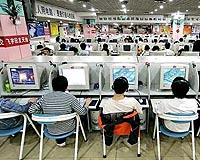 |
Beijing (AFP) Feb 19, 2010 China on Friday bitterly condemned US President Barack Obama's meeting with the Dalai Lama, saying it had "seriously harmed" relations and summoning the American ambassador in Beijing to protest. The denunciation came swiftly after Obama vowed support for Tibetan rights in his White House talks with the exiled Tibetan spiritual leader on Thursday, a meeting that China had repeatedly warned against. "The US action seriously interfered in Chinese internal affairs, seriously hurt the feelings of China's people and seriously harmed China-US relations," said a statement released by foreign ministry spokesman Ma Zhaoxu. Ma said the meeting "grossly violated basic norms of international relations" and US pledges to respect Chinese sovereignty. The White House had meticulously planned the meeting in hopes of containing Chinese protests, inviting the Dalai Lama to a private area of the executive mansion rather than the Oval Office and not allowing cameras inside. But the 74-year-old Buddhist monk took the unusual step of mingling with reporters afterwards, telling them he was "very happy" with Obama's support and even engaging in a playful snowball fight. The White House later put out a picture of the two Nobel Peace Prize laureates in the 45-minute meeting and issued a statement backing the Dalai Lama's goals. "The president stated his strong support for the preservation of Tibet's unique religious, cultural and linguistic identity and the protection of human rights for Tibetans in the People's Republic of China," White House spokesman Robert Gibbs said. "The president commended the Dalai Lama's 'middle way' approach, his commitment to non-violence and his pursuit of dialogue with the Chinese government," Gibbs said. The Dalai Lama, who fled his homeland for India in 1959, advocates a "middle way" of seeking greater rights for Tibetans while accepting Chinese rule. Beijing accuses the Dalai Lama of plotting to split up China, dismissing his conciliatory approach as insincere. China said Vice Foreign Minister Cui Tiankai summoned US ambassador Jon Huntsman to lodge "solemn representations". A US embassy spokeswoman told AFP that Huntsman replied by telling Cui "now is the time to move forward and cooperate in ways that benefit our two countries, the region and the world." Chinese foreign ministry spokesman Ma demanded that the United States take immediate steps to "eliminate the pernicious impact" of the White House meeting. Ma added that any attempt to use the "Dalai Lama issue to interfere in China's internal affairs would fail". However, he gave no details and no specific reprisals were unveiled. Some US-based analysts believe China's protests may be geared more for domestic consumption and that it is not interested in upsetting cooperation between the world's largest developed and developing nations. Just hours before the meeting with the Dalai Lama, the USS Nimitz aircraft carrier arrived for a visit in Hong Kong. Beijing had vowed to cut off military ties after the Obama administration last month agreed to sell 6.4 billion dollars in weapons to Taiwan, which China claims as its own. Obama had put off key steps that would anger China in his first year in office, hoping to work together on issues ranging from reviving the global economy to fighting climate change. Obama did not meet with the Dalai Lama last year ahead of the president's first trip to Beijing. With Thursday's encounter, the Dalai Lama has now met every sitting US president since George H. W. Bush in 1991. The Dalai Lama also met Secretary of State Hillary Clinton and was greeted across Washington by hundreds of flag-waving Tibetans who chanted, "Long live the Dalai Lama!" and "Thank you, President Obama!" After his meetings, the Dalai Lama reiterated his stance that Tibet is part of China. "We are fully committed to remain within the People's Republic of China, for our own interest," he told reporters. "Tibet is a landlocked country and, materially, very, very backwards." He also supported US efforts to seek friendly ties with Beijing and voiced understanding for Obama's decision not to see him last year. "It is wrong when some say, contain China. It is wrong," he said. The Dalai Lama did not specify how he expected Obama to support Tibetans, saying: "I think time will tell. "Fifty years have passed. We have never given up hope."
Share This Article With Planet Earth
Related Links China News from SinoDaily.com
 China's 'bridge blogs' show Great Firewall's other side
China's 'bridge blogs' show Great Firewall's other sideShanghai (AFP) Feb 18, 2010 Whether it is about US arms sales to Taiwan or how the film epic "Confucius" stacks up to "Avatar", the world's first snapshot of Chinese opinion often comes from chinaSMACK.com. The website combs China's rowdy web forums, translating popular topics into English to provide a glimpse of what is on people's minds on the other side of the "Great Firewall" of government censorship. "Chinese ... read more |
|
| The content herein, unless otherwise known to be public domain, are Copyright 1995-2010 - SpaceDaily. AFP and UPI Wire Stories are copyright Agence France-Presse and United Press International. ESA Portal Reports are copyright European Space Agency. All NASA sourced material is public domain. Additional copyrights may apply in whole or part to other bona fide parties. Advertising does not imply endorsement,agreement or approval of any opinions, statements or information provided by SpaceDaily on any Web page published or hosted by SpaceDaily. Privacy Statement |